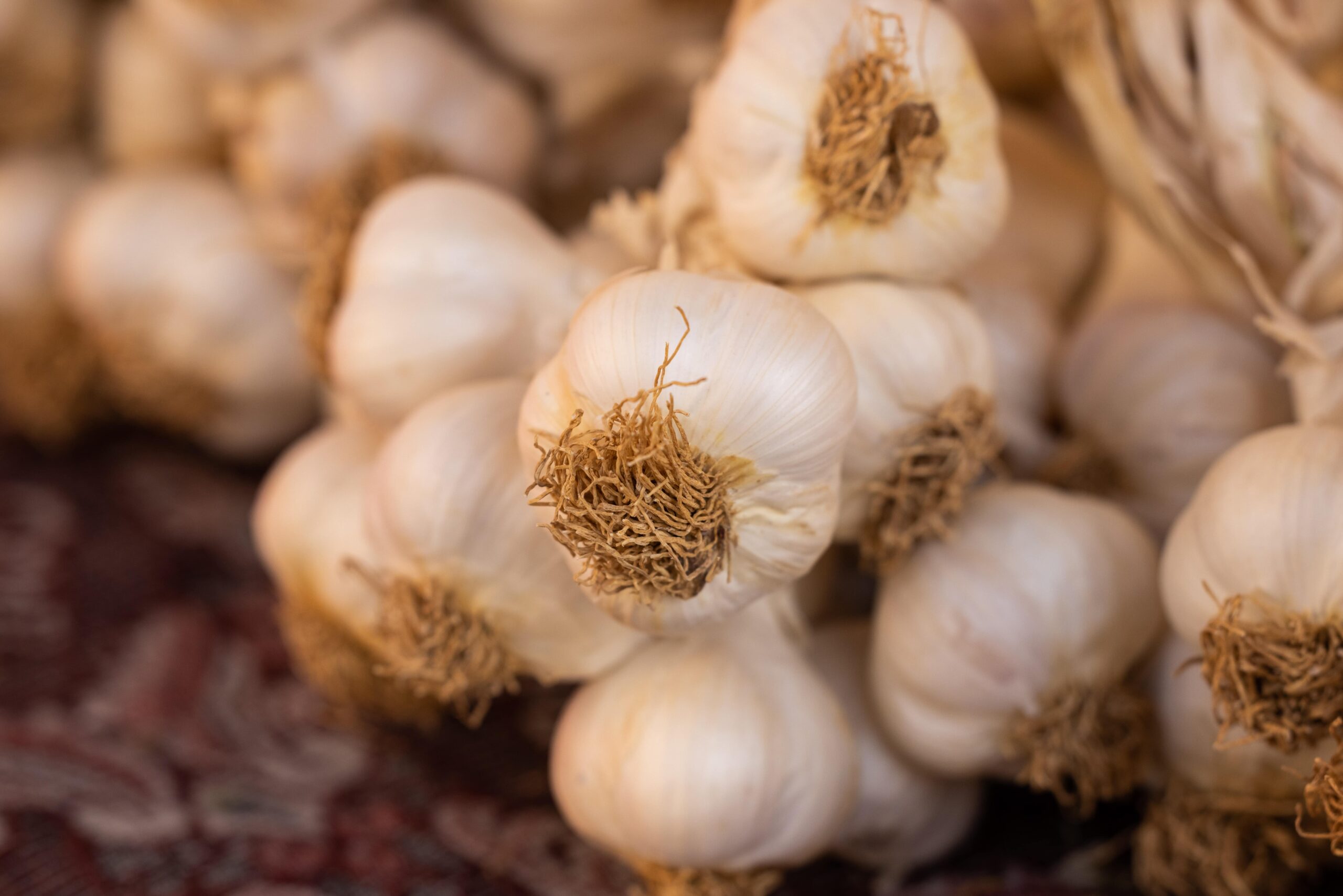Are you looking for 10 Surprising health benefits of eating organic Garlic? Many people that value sustainability, environmental protection, and avoiding chemical residues in their food prefer organic garlic. It is popular among people trying to include healthy and environmentally friendly components in their diet because of its natural flavor and nutritional advantages.
People always asked that what are the health benefits of eating organic garlic every day.
So Here is the list of 10 health benefits of eating organic Garlic every day.
- Boosts immune system
- Lowers blood pressure
- Reduces cholesterol levels
- Has antioxidant properties
- Fights against common cold and flu
- Supports heart health
- Helps in detoxification
- Enhances bone health
- Aids in digestion
- May reduce the risk of certain cancers.
1. Boosts immune system :
The immune system benefits greatly from the strong boost that garlic, known for its potent flavor and scent, provides. Garlic bolsters the body’s defense mechanisms with powerful antioxidants, essential vitamins (C, B6), and minerals like selenium. Its immune-boosting qualities come from allicin, a sulfur molecule that enhances virus and infection-fighting abilities, potentially reducing the severity and duration of colds and flu.
Organic garlic has many more health advantages besides strengthening the immune system. Garlic may help lower blood pressure and cholesterol levels, which may improve cardiovascular health, according to research. Due to its antioxidant capabilities, which shield cells from oxidative stress, there may be a decreased risk of developing chronic illnesses. Furthermore, the natural anti-inflammatory properties of garlic may help treat several illnesses. Organic garlic enhances food flavor and richness, making it a vital addition to a health-conscious person’s culinary toolkit. Its inclusion in a balanced diet promotes overall well-being.

2. Lowers blood pressure:
Low blood pressure” indicates that consuming foods like garlic can help reduce hypertension, where blood force against artery walls is consistently high. High blood pressure strains the heart and vessels, increasing the risk of heart disease, stroke, and kidney problems.
Studies suggest garlic’s active compounds, like allicin and sulfur-containing compounds, may lower blood pressure by causing vasodilation, relaxing and widening blood vessels. Including garlic in the diet may benefit those with hypertension or at risk, but it is not a substitute for medical treatment. Consult a healthcare provider for appropriate management.
3. Reduces cholesterol levels:
Reduces cholesterol levels” means that consuming or incorporating certain foods or substances can help lower the levels of cholesterol in the bloodstream. Cholesterol is a type of fat present in our blood, and it is essential for various bodily functions. However, when cholesterol levels become excessively high, it can lead to health issues, particularly concerning cardiovascular health.
It is well known that garlic lowers cholesterol. It contains some substances, such as allicin, which can prevent the liver from producing cholesterol. Garlic can also encourage the body to excrete cholesterol, which helps with its elimination. You may be able to lower your LDL cholesterol (also known as “bad” cholesterol) levels with diet, which can minimize your risk of heart disease and other cardiovascular issues. To effectively manage cholesterol levels and overall health, garlic consumption must be combined with a balanced diet and way of life.

4. Has antioxidant properties:
Has antioxidant properties” means that the substance, in this case, garlic, contains compounds that act as antioxidants. Antioxidants are molecules that help neutralize harmful free radicals in the body. Free radicals are unstable molecules that can cause damage to cells and contribute to various health problems, including aging, inflammation, and certain diseases.
Garlic contains various sulfur compounds, including allicin, which is a potent antioxidant. These compounds help the body combat oxidative stress by neutralizing free radicals, thereby protecting cells and tissues from potential damage. By consuming foods rich in antioxidants, like garlic, individuals can support their body’s defense against oxidative damage and promote overall health and well-being.
5. Fights against common cold and flu:
Garlic, a widely used culinary ingredient, has been traditionally recognized for its medicinal properties. One of its notable health benefits is its ability to fight against the common cold and flu. The active compound responsible for this immune-boosting effect is allicin, which garlic forms when you crush or chop it.
Consumed allicin boosts the immune system and encourages the development of white blood cells, which fight viruses and illnesses. Additionally, it has antibacterial characteristics that serve as a natural barrier against a variety of infections, including the viruses that cause the common cold and the flu.
Regular use of garlic has demonstrated the ability to help reduce the frequency and intensity of colds and fluIt may help lessen the severity of these infections and relieve bothersome side effects like coughing, sore throat, and nasal congestion. The anti-inflammatory effects of garlic can also soothe inflamed respiratory passages and alleviate breathing problems.
Incorporating garlic into the diet during cold and flu seasons or at the onset of symptoms can be beneficial.
Fresh organic garlic is preferred for its full health benefits. Consult a healthcare professional for individual conditions. Garlic boosts the immune system against colds and flu.

6. Supports heart health:
Supporting heart health is one of the notable benefits of incorporating garlic into one’s diet. Garlic has been studied extensively for its potential to promote cardiovascular well-being and reduce the risk of heart-related conditions. Several mechanisms contribute to garlic’s positive impact on heart health.
Firstly, researchers have found that garlic helps lower blood pressure levels. High blood pressure is a significant risk factor for heart disease, and research suggests that the bioactive compounds in garlic, particularly allicin, can relax blood vessels and facilitate better blood flow, thus helping to regulate blood pressure.
Secondly, garlic is known for its cholesterol-lowering effects. High levels of LDL cholesterol (often referred to as “bad cholesterol”) in the blood can lead to plaque buildup in the arteries, increasing the risk of atherosclerosis and heart attacks. Garlic may help reduce LDL cholesterol levels and inhibit its oxidation, promoting better arterial health.
Additionally, garlic’s antioxidant qualities combat oxidative stress and inflammation in the cardiovascular system. Garlic helps prevent blood vessel damage and lowers the chance of atherosclerotic plaque formation by scavenging dangerous free radicals.
Additionally, garlic has antiplatelet characteristics that might stop excessive blood clotting. While healthy blood clotting is necessary for wound healing, unchecked clotting can result in severe blood artery blockages that can cause heart attacks or strokes. The antiplatelet properties of garlic help to preserve normal blood flow and lower the risk of cardiovascular events.
In conclusion, regular consumption of garlic can be a beneficial dietary addition for supporting heart health. However, it is essential to remember that while garlic shows promising effects, it is not a substitute for a balanced diet and a healthy lifestyle. Individuals with specific health conditions or taking medications should consult their healthcare provider before significantly increasing their garlic intake.
7. Helps in detoxification:
Garlic plays a role in detoxification due to its sulfur-containing compounds, particularly allicin. These compounds support the body’s natural detoxification processes by aiding in the elimination of harmful substances and toxins. The sulfur compounds in garlic stimulate the production of liver enzymes that help break down and remove toxins from the body. Additionally, garlic promotes the excretion of heavy metals like lead and cadmium, which can accumulate in the body and pose health risks over time.
Including garlic in your diet can support your body’s detoxification pathways and contribute to a healthier system overall. By assisting the liver in eliminating harmful substances and assisting in the removal of heavy metals, garlic acts as a natural detoxifier, enhancing the body’s ability to purify itself and maintain optimal health.
8. Enhances bone health:
Enhancing bone health is one of the significant benefits of consuming garlic. Garlic contains essential nutrients like manganese, calcium, and vitamin B6, which play a crucial role in maintaining strong and healthy bones. These nutrients aid in the formation and repair of bone tissue, contributing to overall bone density and preventing conditions like osteoporosis. Regular consumption of organic garlic can be especially beneficial for aging individuals who are more susceptible to bone-related issues.
Furthermore, garlic’s anti-inflammatory properties also contribute to its positive impact on bone health. Chronic inflammation can lead to bone loss and weaken bone structure. Garlic’s ability to reduce inflammation in the body may help in safeguarding bone health and reducing the risk of bone-related ailments. Adding organic garlic to a balanced diet can be a simple yet effective way to support and enhance bone health throughout life.
9. Aids in digestion:
Garlic can help with digestion and support a healthy digestive system, especially when ingested fresh. Allicin, one of the essential components in garlic, has antibacterial qualities that can help get rid of dangerous bacteria in the gastrointestinal tract. This can reduce the discomfort of gas, bloating, and indigestion.
Furthermore, garlic stimulates the production of digestive enzymes that facilitate the breakdown of food and the absorption of nutrients. It acts as a prebiotic, promoting beneficial gut bacteria for a balanced gut microbiome.
Garlic’s sulfur compounds protect the stomach lining, reducing gastric ulcer risk and supporting digestion.
However, it’s important to note that while garlic can be beneficial for digestion, excessive consumption may irritate some individuals. Moderation is key, and it’s always best to consult with a healthcare professional for personalized advice.

10. May reduce the risk of certain cancers:
Garlic, a popular culinary ingredient, has long been linked to potential health benefits, including its capacity to reduce the risk of certain cancers. Garlic is a topic of interest in the world of medical research due to studies that have examined its ability to fight cancer.
Garlic’s high concentration of sulfur-containing chemicals, especially allicin, is a significant factor in its ability to fight cancer. Chewing, dicing, or crushing garlic produces allicin, which is believed to have potent antioxidant capabilities. These antioxidants help the body defend against harmful free radicals linked to cellular deterioration and cancer.
Garlic’s potential to reduce the risk of certain cancers, particularly those of the digestive system, has been extensively studied. Research suggests that regular consumption of garlic may lower the risk of developing colorectal, stomach, and esophageal cancers. Studies have indicated that the organosulfur compounds found in garlic may inhibit the growth and proliferation of cancer cells and promote cancer cell death, thus acting as potential cancer preventive agents.
Moreover, garlic’s immune-boosting properties also contribute to its cancer-fighting potential. A strengthened immune system better detects and eliminates cancerous cells before proliferation and harm.
It is important to note that while garlic shows promise in reducing the risk of certain cancers, it is not a replacement for medical treatment or a cure for cancer. Rather, it can be a valuable addition to a balanced diet and a healthy lifestyle.
Consult a healthcare professional before adding garlic to your diet, especially if you have medical conditions or take medications. Organic garlic’s cancer-fighting potential needs more research.
In conclusion, it is thought that the antioxidant components in garlic, which may help lower the incidence of some cancers, especially those involving the digestive system, are responsible for the herb’s ability to fight cancer. Including garlic in a balanced diet could be a quick and effective step toward enhancing general health and wellness.

Frequently Asked Questions
1. what are the benefits of organic Garlic?
Organic garlic offers several health benefits due to its natural cultivation and lack of synthetic pesticides or chemicals.
2. what are the 5 health benefits of Garlic?
- Rich in Antioxidants: Organic garlic is packed with antioxidants that help combat harmful free radicals in the body, reducing oxidative stress and promoting overall health.
- Boosts Immune System: The natural compounds in organic garlic, such as allicin, can enhance the immune system’s ability to fight infections and illnesses.
- Cardiovascular Health: Regular consumption of organic garlic may contribute to improved heart health by lowering blood pressure and reducing cholesterol levels.
- Antibacterial and Antiviral Properties: Organic garlic’s antimicrobial properties make it effective against various bacteria and viruses, supporting the body’s defense against infections.
- Anti-Inflammatory Effects: The compounds in organic garlic may aid in reducing inflammation, which links to various chronic diseases.
Include organic garlic in a balanced diet and consult a healthcare professional, especially for specific health conditions or allergies. Enjoy its flavorful benefits!
3. What diseases does garlic treat?
For centuries, people have traditionally used garlic for its medicinal properties. While it’s not a cure-all, it’s believed to have potential benefits in treating and preventing various health conditions. Some of the diseases and health issues garlic is thought to treat or alleviate include:
- Common Cold and Flu: It is believed that garlic’s immune-boosting properties help reduce the severity and duration of cold and flu symptoms.
- Hypertension (High Blood Pressure): Regular consumption of garlic may contribute to lowering blood pressure and promoting cardiovascular health.
- Garlic reduces LDL cholesterol levels, known as “bad” cholesterol.
- Bacterial and Viral Infections: Garlic’s antimicrobial properties are thought to help combat certain bacterial and viral infections.
- Digestive Issues: Garlic may aid in digestion and help alleviate certain digestive problems.
- Inflammation: It is believed that garlic’s anti-inflammatory properties help reduce inflammation in the body.
- Osteoporosis: Some studies suggest that garlic may support bone health and reduce the risk of osteoporosis.
- Diabetes: Garlic may have a positive impact on blood sugar levels in individuals with diabetes.
- Respiratory Conditions: Garlic’s antimicrobial and anti-inflammatory effects may be beneficial for respiratory health.
- Certain Cancers: Some research indicates that garlic may have cancer-fighting potential, particularly in reducing the risk of certain digestive system cancers.
Garlic’s promise requires more research. Consult healthcare professionals if you have health conditions or take medications; it’s not a medical treatment substitute.
Garlic enhances flavor, wellness, and potential health benefits as part of a balanced diet.
4. Who should not eat garlic?
Garlic is generally safe and beneficial, but some should limit or avoid it, including:
- Allergic Reactions: Some individuals may be allergic to garlic, experiencing symptoms such as skin rashes, itching, or gastrointestinal distress. If you have a known garlic allergy, it is essential to avoid garlic and products containing garlic.
- Gastrointestinal Sensitivity: Garlic can cause gastrointestinal discomfort, including heartburn, bloating, and gas, in some people. If you experience such issues after consuming garlic, you may want to reduce or eliminate its intake.
- Bleeding Disorders: Garlic has blood-thinning properties and may interfere with blood clotting. If you have a bleeding disorder or are taking blood-thinning medications, consult your doctor before consuming garlic supplements or in large quantities.
- Surgery: Due to its blood-thinning effects, it is advisable to avoid garlic consumption for at least two weeks before undergoing surgery to minimize the risk of excessive bleeding during the procedure.
- Medication Interactions: Garlic may interact with certain medications, such as anticoagulants, antiplatelet drugs, and some HIV medications. If you are taking any medications, especially those with known interactions with garlic, talk to your healthcare provider before including garlic in your diet.
- During nursing, limit garlic intake due to potential flavor changes in breast milk affecting some infants. Consult healthcare professionals for concerns. Garlic has health benefits, but individual reactions vary, so consider your situation before adding it to your diet.



